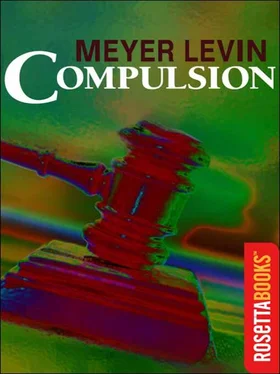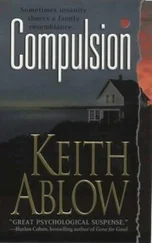It may be that he said it as well, then, to our circle of reporters, as it was ever said in court. As we hurried out with our copies, we talked angrily of Mike and his scoop. Only Danny Mines of the News said, “Hell, any one of us wishes he had done it.” And there was again the question never entirely resolved in the mind of the newspaperman, the fundamental question of the means and the end.
And it must be asked, had Mike never stolen that report, would all that we know have become known? Would even that slight mention, “He admits to four other episodes” – characterized as A, B, C, D , and not further examined – ever have come to public knowledge?
The report had one stunning effect on our conception of the crime. Until then, Tom and I, like almost everyone else, had felt Judd to be the dominant power, the Svengali, the dark, sinister one; but in the office, as we digested the material, we saw that we had been wrong, everyone had been wrong. Except, I thought, Ruth.
For the alienists showed in detail how Artie had been the instigator, the leader, and Judd his “gang”. Judd had been tied to him in passion. While Tom rushed out the excerpts, I phoned Horn. He was in high spirits, alternating between ridicule of all that flimflam and indignant demands that the obscure parts be illuminated. “ A, B, C, D – that’s all crime means to Mr. Wilk and his friends!” Horn shouted. “Just a couple of little boys that can say A, B, C, D , with a murder for each!” And that gland stuff – the boys were known in jail to be in perfect health. As for all those daydreams, kings and slaves, was Wilk actually going to come into court with that nonsense? No wonder he wouldn’t dare face a jury!
The terrible pressure of catching up with the American was over. Going home, I took the report along. I had really only skimmed it. After supper, I passed by Wilk’s apartment, and ran into Willie Weiss. He started at once on the report. What did I think? The material on Judd – his tremendous conflicts: Was he a boy or a girl? Was he a Jew or a Christian? Willie had never himself realized how completely Judd was torn.
From what he said, I had completely missed the important meanings of the material. We went to an ice-cream parlour on 61st Street, and Willie, with that feverish argumentative way he had, started to show me what I had missed.
Why had I paid so little attention to the family history? “Look at this-” There had been three unsuccessful pregnancies before Judd was born, and his mother had been sick throughout her pregnancy with him. Judd had always blamed himself for her illness, even for her death.
“He must have blamed his father, too,” Willie added. “Don’t forget he’s precocious. Kids get a strange idea, when they first begin to catch on – they imagine that fathers do something terrible to mothers. And this child feels his birth killed his mother, but his father killed her first. It’s the classic complex, the Oedipus-”
The term was not so popular then, but passionately Willie explained to me how well the Oedipal situation fitted the case, the boy in love with his mother, hating his father.
“His Baby Book records his first step at three months, his first word at four months.”
From the very earliest impressions, Judd was made to feel he was someone utterly extraordinary. And with this he had to keep up.
A small and sickly child, “until he was nine he had gastrointestinal disorders, complicated by fever, headaches, vomiting.” Anxiety, said Willie. He had been rather effeminate up to that age – that was the period of the girls’ school. “How could this child know what he really was?” Willie demanded. “He’s small, delicate like a girl; he hates girls because he knows he should be more of a boy, yet he is always thrust among girls. His father tries to send him to public school, but his mother still insists her darling is too frail, too special, too different. The father overrides the mother. Judd tries the public school.” Of this, the report said, “He realized his superiority over the other boys in wealthy parents, in the fact that his nurse accompanied him to and from school, and that he couldn’t attend the toilet in the school.”
“Poor bastard, holding himself in!” was Willie’s comment on this point. “Imagine this kid, feeling he is so special he can’t even use the can! No wonder he got a god complex!”
We turned back to the report. It went on to tell of his cataloguing all the churches, of his Madonna fixation on his mother.
This Willie seized upon. It fitted perfectly. “You see, by the Madonna fixation, he gets rid of his real father, whom he resents bitterly. And that leaves him free to consider himself as a magical, superior being, even magically born, the son of God. And look at this-” The report spoke of Judd’s innumerable sketches, all over his classroom notebooks. Of the thousands of things he drew the first item was “Crucifixions”. “The most interesting part of the Crucifixion for him appears to be somebody nailed to something.”
His mother was a Madonna, he was a Christ. And here, Willie supplied another conception that was new to me: “Remember, the church is a mother-idea, everything about the church is seductive, feminine; and the synagogue is a father-religion, harder and more austere, stemming from the patriarchs.”
And so Willie explained Judd’s conflict over being a Jew. At the time it seemed far-fetched to me, seemed perhaps a reflection of Willie’s own excessive concern with his “Jewish appearance”.
“But look,” Willie said, “Christ is born a Jew but in reality He becomes the symbol of Christianity. Isn’t this an inevitable identification for someone who is struggling with his Jewishness? Judd runs around to all the churches but hasn’t quite got the nerve to renounce his father-religion, to become a meshumed , a convert, so he nominally rejects all religion and says he’s an atheist. Wait. Look at his fixation on Artie-”
“But what’s that got to do with religion?”
Willie’s eyes gleamed. “Look at Artie, a tall blond fellow who is everything Judd wanted to be in appearance, who doesn’t look Jewish at all, a real collegiate shagetz type, and look what Judd says: ‘I identified myself with him completely.’” Now Willie lowered his voice, producing his culminating point. “I’m sure Judd never thought of this overtly. But remember, Artie’s mother is a Catholic. If Judd were Artie, he could more literally sense himself as the son of the Madonna.”
I thought it was too pat.
Actually, Willie argued, the entire subject of Jewish self-hatred was a rather new concept. He had read the basic book, available only in German. It showed how every Jew had a wish not to be burdened with the problem of being a Jew. Then came the guilt feeling for harbouring such a wish. “Haven’t you ever felt it?” he challenged me.
I could not deny that his words called up something of the sort in me. “All right. Then why should such a feeling make Judd kill Paulie Kessler?”
“Why? Self-destruction! They picked a boy, a Jewish boy, just at the age when Jews become Jews – thirteen, the bar-mitzua age.”
That was going too far. “They picked him at random, on the street-”
“Yes. That’s what they claim,” he said fanatically. “That there is no meaning, that everything is at random. Do you think that maybe, somewhere far back in their minds, it didn’t ring home that Paulie Kessler was the son of a pawnbroker, the symbol of everything that is shameful in being a Jew?” He leaned back, and grinned at me.
I wanted at first to laugh. Yet his ideas echoed and echoed. Wasn’t I, myself, ashamed? Didn’t I sometimes feel a secret rage at my father’s being a cheap Jewish cigar-maker?
Читать дальше












